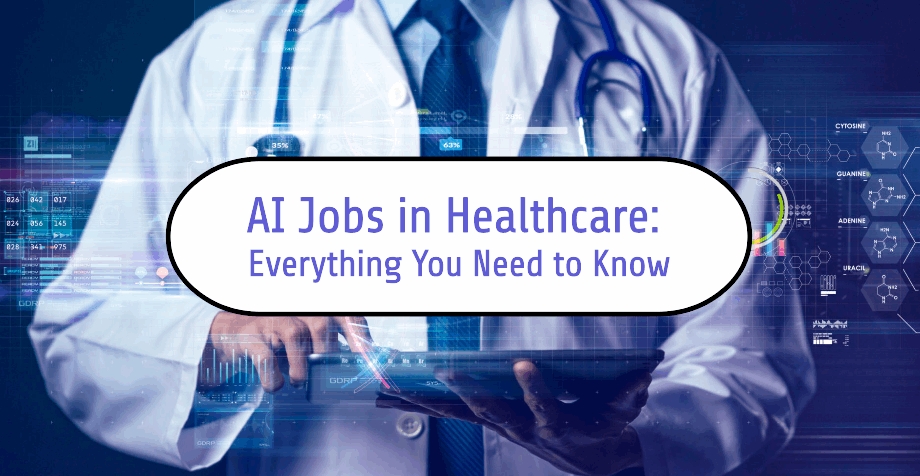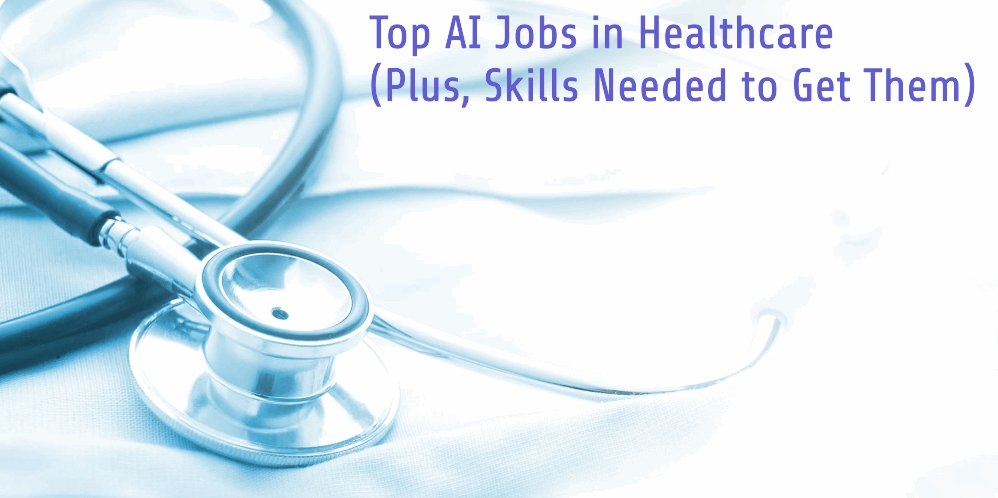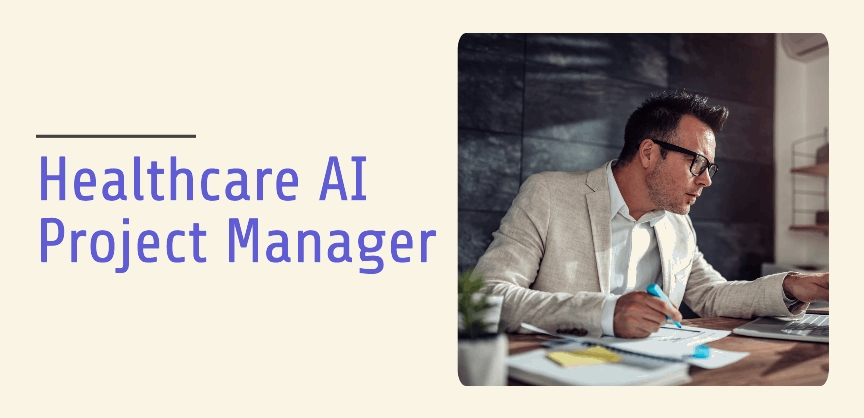Careers in AI are projected to grow at an impressive 21% from 2021 to 2031. Artificial intelligence is revolutionizing several industries. Medical is no exception. From predictive analysis to robotic procedures, AI is shaping the way humans get treatment. In this blog post, we’ll talk about the role of artificial intelligence in the healthcare industry and to what extent it’ll replace human jobs. You’ll also get to know the top AI jobs in healthcare, and you can start applying as a fresh AI graduate. By the end, you’ll have the information you need to confidently navigate the AI job market and land your first job as soon as possible. Let’s dive in. \
Artificial Intelligence in Healthcare
AI has a key role to play in the healthcare industry. Here are some key areas where it’s being applied:
- Diagnosis: AI can analyze images like X-rays, CT scans, and MRIs and help doctors diagnose medical conditions.
- Drug Discovery: AI can help humans discover new drugs and predict their effectiveness.
- Predictive Analysis: AI models can be used to forecast disease outbreaks and patient risks.
- Robotic Surgeries: The technology can help conduct surgeries with precision.
- Remote Patient Monitoring: Doctors can track their patients’ health with AI-powered wearable devices.
- Medical Research: Humans can use AI to analyze vast amounts of data and generate hypotheses.
Will AI Take My Job?
There’s a growing fear that AI will replace human jobs in several industries. While that’s true to some extent, the answer is much more nuanced. While AI can handle repetitive and data-intensive tasks, it can’t fully replace humans yet. Professionals should think of it as a friend rather than a foe. In healthcare, AI can assist in surgeries, handle data analysis, image recognition, and more. Importantly, human assistance is needed at almost every stage of these processes. However, there are some jobs that can be partially or fully outsourced to AI, including image analysts, medical transcriptionists, pathologists, etc.
Top AI Jobs in Healthcare (Plus, Skills Needed to Get Them)
Here are the top AI jobs in healthcare and what skills you need to get them.
Data Analyst
Healthcare data analysts interpret large sums of data with the help of AI. The goal is to help improve operational efficiency and patient outcomes. The skills you need to land this job include:
- Proficiency in statistical software
- Analytical and crucial thinking
- Knowledge of healthcare data systems
You May Also Like: AI Graduate Jobs (Not Specific to Medical)
Medical Data Scientist
A medical data scientist needs data science, medical research, and healthcare expertise to be successful in this role. Their primary responsibilities include data analysis, predictive modeling, decision support, data visualization, research support, and more. The specific skills you need are:
- Machine learning and AI expertise
- Programming languages proficiency (E.g., Python and R)
- Understanding of medical terms
- Problem-solving
Healthcare AI Engineer
An AI engineer applies different AI and machine learning techniques to overcome challenges within the industry. He or she designs AI solutions tailored for different healthcare applications, such as treatment recommendation systems and diagnostic tools. To be a good healthcare AI engineer, you need to be good at AI and machine learning techniques, software development, and project management. Knowledge of healthcare standards and technologies is also important.
Healthcare AI Prompt Engineer
A prompt engineer develops prompts for AI tools to generate responses and execute different applications. Healthcare AI prompt engineers create and refine AI prompts that drive healthcare interactions, such as patient communication. Plus, they help generate AI prompts for healthcare applications, ensuring that AI systems generate accurate outputs. Skills needed to be a successful healthcare AI prompt engineer:
- Expertise in natural language processing (NLP)
- Proficiency in programming languages (e.g., Python)
- Understanding of healthcare processes and terminologies
- Strong attention to detail
Related: A Day in the Life of an AI Engineer
Healthcare AI Project Manager
The role of a healthcare AI project manager is to oversee AI projects within a healthcare organization. Their job is to ensure the projects are completed on time, within the prescribed budget, and meet quality standards. They oversee and manage interdisciplinary teams. Project managers need to have strong project management skills, knowledge of AI and healthcare technologies, excellent communication and leadership skills, and the ability to manage cross-functional teams.
AI Ethics and Compliance Specialist
Artificial intelligence can prove to be a game-changer for the growth of the healthcare industry going forward. But, the technology has its challenges. Probably the most prominent one is to leverage it while complying with all the healthcare laws and regulations. Any professional using AI to perform any task will have to be accountable for the results, so they need to be cautious. As an AI ethics and compliance (The exact name of the role may vary), you’ll need to be good at organization, communication, and problem-solving.
AI Jobs in Healthcare: FAQs
Let’s discuss some frequently asked questions about AI jobs in healthcare.
What Does AI Do in Healthcare?
AI can perform a variety of tasks in the healthcare industry. Some common ones are predicting patient outcomes using historical data, assisting in robotic surgeries, streamlining repetitive tasks, analyzing medical images, personalizing treatment plans using patient data, and more.
What Healthcare Jobs Will AI Replace?
AI will most likely replace specific tasks within jobs rather than completely replace the role. For instance, a radiologist can use AI to analyze images, but human analysis will still be important for accurate diagnosis. In addition, administrative tasks that are repetitive can be outsourced to AI. Similarly, AI tools can now transcribe medical texts with accuracy.
What is the Demand for AI In Healthcare?
The demand for AI in healthcare is rapidly increasing. According to a report, AI in healthcare could save the industry $150 billion per year by 2026. As a result, there will be an increasing need for AI professionals in almost every aspect of healthcare going forward.
Conclusion
The integration of AI in healthcare has opened up several job opportunities for AI graduates. As we move forward with the advancements, some roles in healthcare will evolve and be partially automated, but human involvement will remain irreplaceable. For those with AI expertise and an interest in making a difference in healthcare, the coming years offer exciting prospects. As AI becomes more sophisticated, professionals need to adapt and learn continuously to stay relevant.
You May Also Like: AI Jobs of the Future (And the Most Important Skills)
Sources:
- https://www.accenture.com/au-en/insights/health/artificial-intelligence-healthcare#:~:text=Growth%20opportunities%20are%20hard%20to%20come%20by%20without,savings%20for%20the%20US%20healthcare%20economy%20by%202026.
- https://partnerstack.com/articles/ai-job-growth
- https://www.healthcareitleaders.com/blog/ai-jobs-in-healthcare/


